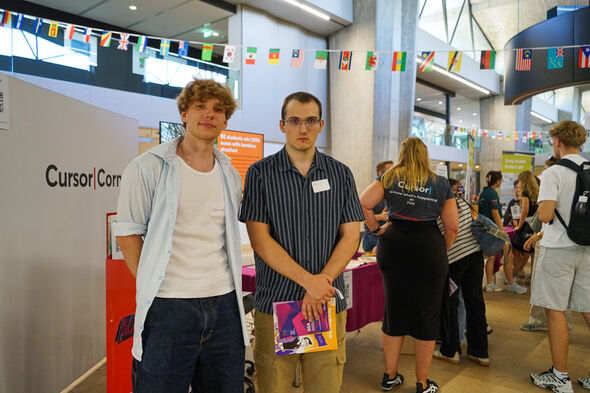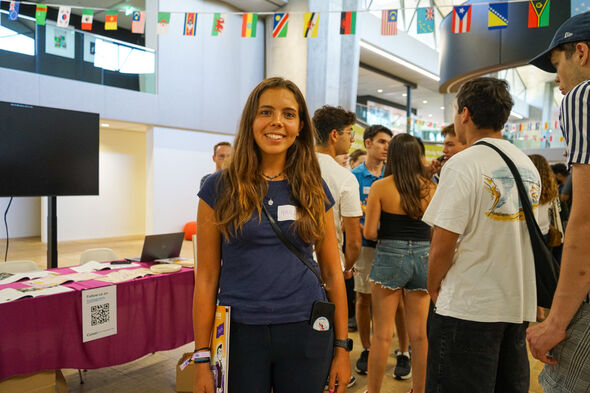
Many applicants, but few rooms for new internationals
Internationals encourage each other during Welcome Day
Only 300 student housing units and 2,400 interested applicants. If you’re coming to Eindhoven to study and need a place to live, you’ll need a good dose of luck—and plenty of patience. During Welcome Day, international students are offering each other encouragement. “TU/e has arranged everything wonderfully—except housing,” says Giulia from Italy.
Last year, the number of international bachelor’s and master’s students coming to TU/e increased by no less than 24 percent. This year again, many new students abroad have arrived in Eindhoven to start their studies. Almost all of them need (independent) housing—and that’s where the problem lies. The Netherlands is facing a housing crisis.
TU/e is working with the municipality of Eindhoven, housing associations, and student housing providers on student-focused housing solutions. Last year, two new residential towers opened on campus, and there are plans for new student housing in other parts of the city. But it’s still not enough, and progress is slow.
Scammed
That’s something students attending Friday’s Welcome Day—organized especially for international students—are experiencing firsthand. Džiugas from Lithuania is one of the students still without housing. Well, almost—he did have a room, until the landlord told him last week it was no longer available.
“A huge disappointment,” he says gloomily. “I probably got scammed.” According to the Dutch Student Union (LSVb), students are increasingly falling victim to scams and fraud while searching for housing. Džiugas had been referred by a former classmate already studying in the Netherlands, but it still went wrong. He communicated with the landlord via Facebook and WhatsApp.
Since arriving in the Netherlands, he’s been staying temporarily with his friend Vilius, who’s also starting at TU/e. Until the end of August, Džiugas will be in an Airbnb. Soon another former classmate will join them—bringing his camper van. “For now, he and I plan to live in it,” says Džiugas. “Unfortunately, TU/e can’t help me further.”
That’s correct, confirms Johanna Mavromichalis, housing officer at the International Office. Finding accommodation is each student’s own responsibility. “We don’t mediate for individual students in the housing market. But we do provide extensive information on our housing page, and we organize an annual lottery for incoming international bachelor’s and master’s students who are not yet registered in the Netherlands.”
For this, TU/e works with several partners, including Vestide, Holland2Stay, The Social Hub, Xior, and Plaza Resident Services. “In spring we discuss how much housing will be available in summer and check with Campus & Facilities for new leads in Eindhoven,” says Mavromichalis. “This year, 2,400 international students entered the lottery, and we had just over 300 rooms available.”
I often read that housing was only available to Dutch students—that made it even harder
Most students miss out, but some get lucky—like Nidhi from India. In the first round she wasn’t selected and started to panic. “I contacted lots of other new international students to ask if they had housing and were looking for a roommate.” In the end, it wasn’t necessary—she was eventually selected in a later round.
She advises other students to start their search early. “I scoured many websites. Often I read that housing was for Dutch students only, and since I had no contacts in Eindhoven, that made it extra challenging.”
Staying optimistic
Giulia from Italy wasn’t so lucky—she never got a room through the lottery. “TU/e has arranged everything wonderfully—except housing,” she says. She has registered with “every conceivable agency” and responded to “every available room” but without success. Still, she remains optimistic. Her parents traveled with her and will leave in three days. “They’ve told me not to worry too much. They promised there will be a solution.”
Eric from Romania can also count on family support. His mother is moving to Utrecht next week for a new job, and he can live with her. “It’s pure coincidence that we’re both coming to the Netherlands,” he says. The commuting distance doesn’t bother him. “In Romania, I had to take public transport for an hour to get to high school—and the system wasn’t as good as here.”
His fellow countryman Marius agrees. He’s happy he managed to get a room on campus this week. “Commuting from another city doesn’t seem ideal, especially if you have early morning or late evening classes,” he says. “But it’s still better than sharing an apartment with four or five students. Yes, I’ve actually heard of that happening.”
Private market
Vilius, the friend from Lithuania, took a different approach. “My father and I contacted private landlords directly this spring. It still took a while, but in the end I found a studio 20 minutes from campus.” There’s a price, though: €1,250 per month, including utilities.
“We do hear from many students that there’s a real need for more affordable student housing,” says Mavromichalis from the International Office. “There aren’t many units available, and the private market is extremely expensive. Monthly rents of between one and two thousand euros are not unusual.”
This article was translated using AI-assisted tools and reviewed by an editor.



Discussion